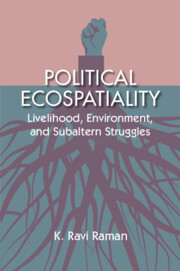Book contents
- Frontmatter
- Contents
- Acknowledgements
- 1 What Is Politics Proper? Why Political Ecospatiality Matters?
- 2 Birlas in Communist Kerala: Clash and Consensus as Subaltern Narratives
- 3 Occupy Muthanga: Land, Forest, and Reinventing Indigeneity and Identity
- 4 Dalits and the Global Cola: Water, Power, and Resistance
- 5 Politics, Epistemology, and Environmental Modernity: Anti-endosulfan as Ethical Practice?
- 6 Caste, Land, and the State: What If Chengara Took the Place of Muthanga?
- 7 Pombilai Orumai: Plantation Dalits, Intersectionality, and Power
- 8 Ecospatiality: Right-Making/State-Making
- Index
6 - Caste, Land, and the State: What If Chengara Took the Place of Muthanga?
Published online by Cambridge University Press: 31 August 2024
- Frontmatter
- Contents
- Acknowledgements
- 1 What Is Politics Proper? Why Political Ecospatiality Matters?
- 2 Birlas in Communist Kerala: Clash and Consensus as Subaltern Narratives
- 3 Occupy Muthanga: Land, Forest, and Reinventing Indigeneity and Identity
- 4 Dalits and the Global Cola: Water, Power, and Resistance
- 5 Politics, Epistemology, and Environmental Modernity: Anti-endosulfan as Ethical Practice?
- 6 Caste, Land, and the State: What If Chengara Took the Place of Muthanga?
- 7 Pombilai Orumai: Plantation Dalits, Intersectionality, and Power
- 8 Ecospatiality: Right-Making/State-Making
- Index
Summary
Edward Said (1978) introduced the notion of imaginative geography: Groups with a hunger for land essentially reimagine the landscapes they desire, elevating the notion of themselves as the owners of the land they seek, a process of reinventing the meaning of territorial landscapes as ‘imagined geography’. This would help them frame arguments justifying why they are entitled to take possession of the landscapes they desire. Before the actors themselves see and conquer the land, they entertain themselves under a discursive understanding that they are the owners of the landscapes that they covet. Hence, this imaginative geography is a theory of human action deriving from the interplay of material impulses and human consciousness (Gregory 1999); it is ‘performative’. Reimagining landscapes is the first step to acting upon them and creating the very outcomes on the land being imagined (Gregory 2004: 17–20). In this process, hegemonic forces with territorial ambitions refashion themselves as owners of the territory they desire by asserting themselves as masters and sovereign of the land.
Here, one wonders, what is the landscape that has emerged as part of the subaltern project of the imagined geographies? This entails the counterimagination and a contra-discourse of the imaginative geographies by the oppressed, intertwined with the notion of egalitarianism and justice, which could be realized through ecospatial struggles. If this imagined landscape and the struggle for the same is for livelihood and basic human and ‘post-human’ survival, the struggling poor would be forced to follow the logic of their own ‘moral economy’ that historically protected their rights to subsistence (Thompson 1991). The large number of ‘land-wars’ (Levien 2013) that have been taking place in Latin America and Asia, particularly in India, offers how the subalterns imagine their struggles as part of their livelihood and citizenship rights. If it was Muthanga in Kerala in 2003, it was Chengara in 2007. If Muthanga was occupied by the Adivasis, it was the Dalits – formerly the agrestic slaves and the most marginalized of all the outcastes of the Hindus – that occupied the Chengara part of the colonially evolved Harrisons Malayalam plantations. Even after three and a half decades of land reform experimentation how does one explain the Dalit land struggles in Kerala? Can Chengara replace Occupy Muthanga in terms of strategies, struggles, and outcomes? How far did the state succeed or fail in addressing the Dalit land question, their resource endowments, and livelihood?
- Type
- Chapter
- Information
- Political EcospatialityLivelihood, Environment, and Subaltern Struggles in Kerala, pp. 151 - 175Publisher: Cambridge University PressPrint publication year: 2025

